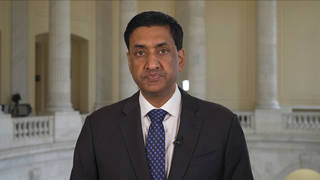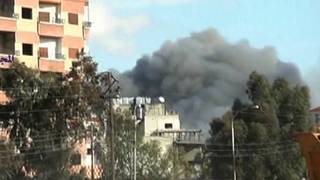
Topics
Guests
- Robert Fisklongtime Middle East correspondent of The Independent newspaper in London. He was just in Syria for two weeks. He is the author of several books, including The Great War for Civilisation: The Conquest of the Middle East.
As the United States moves toward increased intervention in Syria, we’re joined by Robert Fisk, the longtime Middle East correspondent of the British newspaper The Independent. Just back from two weeks in Syria reporting around the capital Damascus, Fisk discusses what he calls the “theater of chemical weapons,” the latest in Syria’s civil war — a battle he says the Syrian government is winning — as well as his reaction to what he calls President Obama’s “pitiful” backing of the recent Israeli missile strikes. “Don’t ask me if they have used chemical weapons,” Fisk says. “It’s conceivable. There really isn’t any proof. What you have got to realize is that this is a propaganda war just as much as it is a savage war, killing many thousands of human beings.”
Transcript
AARON MATÉ: We begin today’s show looking at Syria. Secretary of State John Kerry has arrived in Moscow for talks with Russian President Vladimir Putin following this weekend’s Israeli air strikes on Syrian military facilities. Syria calls the strikes “an act of war” that’s, quote, “opened the door to all possibilities.” Earlier today, the Turkish government described the Israeli attacks as “unacceptable,” calling them, quote, a “golden opportunity” for President Bashar al-Assad to cover up massacres of his opponents.
AMY GOODMAN: The United States is moving closer toward directly intervening in Syria. On Monday, Democratic Senator Robert Menendez of New Jersey introduced a bill to allow U.S.-provided arms, military training and supplies to be sent to some Syrian rebel groups. The bill comes amidst conflicting reports that chemical weapons have been used in Syria.
Meanwhile, the civilian death toll in Syria continues to rise. The Britain-based Syrian Observatory for Human Rights said nearly 200 people died each day in April. Half the nearly 6,000 people killed last month were civilians; nearly 1,700 were rebel fighters; just over a thousand were members of the Syrian army.
For more on Syria, we turn to Robert Fisk, longtime Middle East correspondent for The Independent newspaper in London. He was just in Syria for two weeks. He is author of a number of books, including The Great War for Civilisation: The Conquest of the Middle East.
Robert, welcome back to Democracy Now! Can you talk about your time in Syria? You were embedded with Syrian soldiers?
ROBERT FISK: No, I was not embedded with Syrian soldiers. I’ve never been embedded with American soldiers or British soldiers or Iraqi soldiers or any other. What actually happened was I got a visa to go to Damascus, from the Syrian government, of course. I have a colleague who goes regularly into northern Syria and reports from rebel areas. I spent quite a lot of time talking to old friends in Syria, talking to the military, whom I have always been able to talk to. And while I was talking to them, I said, “Look, I would like to go up to the front lines in northwestern Syria.” That is to say within a mile of the—just a mile and a half of the Turkish border. To my amazement, they said, “Yeah, fine. Get on a plane. Go to Latakia. We’ll meet you there. You can go and see our soldiers and talk to them.” And this is what I did. The only restriction they had on me is they didn’t want me to take photographs of their faces. I could take pictures of them from behind. I could take pictures of the front line. I could climb on their tanks and take pictures, which I did. And I had—I got a pretty graphic and rather grim idea of what the Syrian army—I’m talking about the Syrian government army—is doing at the moment.
I also learned and met the new leader of the Baathist militia, which we sometimes call the “shabiha,” accused of many war crimes, which are now being put under military control and will wear military uniforms and will be paid by the government. Now, whether this means there will be more—fewer excesses and atrocities, or whether it merely means that the government will pay them and they can carry on as they were, I am not sure. I did see a truckload of men with ski masks and heavy machine guns, and I was told these were the members of the so-called National Defense Forces. But don’t get the impression this is some kind of home guard. It’s obviously not. These people will be sent into newly, quote, “liberated,” unquote, villages. What their behavior there will be like, I don’t know.
When I visited Syrian special forces along the front lines, I was given extraordinary amounts of detail. They gave me the code numbers for the various positions they’ve got, told me where the rebels were—about 800 meters away in a forest. I met soldiers who had been wounded but were still serving. One had a bullet that went right through his neck, went through the left side, came out the right side, and a very livid scar. Several of the generals had been wounded, one of them four times. Officers in the Syrian army always say that they go and lead their men, they’re at the front, and it appears to be true.
When I started questioning them about how many armed rebels they had killed in one particular village, they said 700. And I said, “How many did you take prisoner?” And he said, “None.” And in another point, they showed me a destroyed house, that had been destroyed by tank fire, and they said that 67 rebels had been killed there. And I said, “Well, how many prisoners?” And they said, “None,” which obviously told its own story.
At one point, quite remarkably, a general produced from his pocket a video, a phone, a mobile phone with a video on it, showing heaps of corpses of bearded men whom he said were terrorists—his word for it, of course, that usual cliché which the Israelis use, as well, for their enemies—rebel opponents who were Islamists, he claimed. And there were indeed heaps of corpses. What was particularly chilling was when, on the video, which he was showing me—and this, again, remember, was a Syrian general—on two occasions a military boot fell down—came down and crushed two of the dead faces on the screen. So, a ruthless, brutal war going on.
And at the moment, in two of the Damascus suburbs in the area around Qusayr, near Homs, and certainly in the north of Syria, the army appears to be winning, at least momentarily, against the rebels, is taking ground—doing so, of course, with ruthlessness and no great human rights alongside it, I imagine. I don’t think this is an army that cares very much about its enemies, unless they’re dead.
AARON MATÉ: Robert, what’s your assessment of these charges of chemical weapons attacks? Do you think that the Syrian government or the rebels are using them?
ROBERT FISK: Well, I wrote an article in The Independent the other day talking about the theater of chemical weapons. And frankly, after the disgraceful lies which we were told about the weapons of mass destruction in Iraq prior to the invasion by your then-president, Mr. Bush, and our beloved prime minister, Mr. Blair, I tend to take a deeply cynical view of chemical weapons use in any country. We know Saddam used chemical weapons against the Kurds. We tend to forget that the components of those chemical weapons came from New Jersey.
But look, I had a talk with a Syrian army intelligence officer over coffee in Damascus, and I put it very frankly: “Look, you’ve got chemical weapons. You’ve always had chemical weapons, from the Russians. Do you use them?” And he said, “Why on earth would we want to?” He said, “We’ve got MiGs, with firepower infinitely more destructive than chemical weapons. Why would we want to use chemical weapons when we have MiGs with bombs?” which did seem to be a fairly, you know, straightforward argument. I have to say that on none of the soldiers which I saw, either in the area of Darayya, one of the suburbs of Damascus where there’s fierce fighting around the site of Zeinab Mosque in Damascus, or on the northern frontier opposite Turkey, were any of the soldiers carrying gas masks, which, if they were in the habit of using poison gas, they would have done.
Now, we keep having this silly phrase. You know, first of all, the Americans were worried that Assad’s chemical weapons would fall into the wrong hands, meaning the al-Nusra rebel groups, which are Islamists. Presumably, the right hands at that stage were supposed to be Assad’s own armories. Then the next one was that Assad had used chemical weapons. And this sort of bubbled on for a while, and there were inquiries by Médecins Sans Frontières and a not-very-good inquiry by the ICRC. And then we had this extraordinary theater where Israel suddenly said there was some proof, or possibly proof, that [Syria] might have, could have used, might have used, would be able to use, had used chemical weapons. They then started talking about sarin gas. Then your beloved Secretary of State John Kerry turned up in Damascus, returned to the United States, and said that Assad had used chemical weapons. And Obama then said, well, he might have, could have, might in the future, it would be a game changer—a lovely cliché. I mean, at least he admits it’s a game in the Middle East. But at the end of the day, he said, “We’ve got to have some proof.” So we still don’t have proof. Then, of course, we’ve had Carla Del Ponte for the United Nations saying there appears to be evidence or might be evidence that the rebels had used chemical weapons, but there didn’t appear to be any evidence that the government had. Well, blow me down.
There are three young children in a hospital in Tripoli in northern Lebanon who do have deep burns but apparently do not have actual wounds caused by missile parts or bullets. And it’s been suggested that they were the victims of a chemical weapon attack by the Syrian government—possibly, but they also conceivably, according to one doctor I spoke to in Beirut, could have been suffering from the use of phosphorus shells. Now, phosphorus shells should not be used against civilians, only against the military. But it’s quite possible the Syrians do have such munitions. But, of course, that’s not an argument that the Americans would want to take up, since the U.S. used the same munitions on civilians as well as militants in the town of Fallujah during the battles for Iraq seven years ago, eight years ago.
So, don’t ask me if they’ve used chemical weapons. It’s conceivable. There really isn’t any proof. The Israelis don’t appear to have any proof. The Americans don’t appear to have any kind of finite proof. And I don’t think the U.N. has any finite proof that the rebels have used it. What you have got to realize is that this is a propaganda war just as much as it is a savage war killing many thousands of human beings.
AMY GOODMAN: This is—
ROBERT FISK: And the propaganda war is very much pointing the finger, of course, at Iran, which may be why the Syrian war is being fought.
AMY GOODMAN: Robert Fisk, this is retired Army Colonel Lawrence Wilkerson, former chief of staff to Secretary of State General Colin Powell. Wilkerson is raising questions about the reports of chemical weapons attacks in Syria. He appeared on Current TV.
LAWRENCE WILKERSON: We don’t know what the chain of custody is. This could have been an Israeli false flag operation. It could have been an opposition in Syria—and one wonders what part of the opposition—false flag operation. Or it could have been an actual use by Bashar al-Assad. But we certainly don’t know with the evidence we’ve been given. And what I’m hearing from the intelligence community is that that evidence is really flaky. So, there’s no way I would say my red line had been crossed and start something serious in terms of U.S. intervention based on this very flimsy evidence.
AMY GOODMAN: That’s [Lawrence] Wilkerson, the former chief of staff of then-Secretary of State Colin Powell. But I wanted, Robert Fisk, to get your response to the latest news of the Israeli attack in Syria. When President Obama was in Costa Rica, he spoke briefly about this weekend’s Israeli air strikes. He said Israel has the right to stop weapon shipments to Hezbollah.
PRESIDENT BARACK OBAMA: I’m not going to comment on what happened in Syria yesterday. I’ll let the Israeli government confirm or deny whatever strikes that they’ve taken. What I have said in the past, and I continue to believe is, is that the Israelis justifiably have to guard against the transfer of advanced weaponry to terrorist organizations like Hezbollah. With respect to the larger issue of Syria, as I said yesterday, I don’t take any options off the table as commander in chief. Circumstances can change; you never know what contingencies you have to deal with. But what I do know is that I cannot see a scenario right now in which American boots on the ground would make any sense.
AMY GOODMAN: That’s President Obama. He was speaking in Costa Rica. Robert Fisk, what is your response to the two Israeli attacks in the last few days, three overall this year, on Syria?
ROBERT FISK: Well, the Obama comment was pitiful. I mean, what he’s effectively doing is giving the right to anybody, claiming they’ve got a right to defend, to attack another country. I mean, if Syria decided to take out a couple of Israeli nuclear warheads in the Negev and said, well, it had the right to defend itself and it feared these missiles might be fired at Syria, Mr. Obama would be promising us that the red line had indeed been crossed, and it would be World War III. But when Israel bombs Syria—admittedly a horrible regime, but it did—that’s OK, it can defend itself, it’s a matter of self-defense.
The real point, of course, is that we’ve been accusing the Iranians and the Hezbollah of being involved in this Syrian civil war, which they have been, but not as much as we claim they have. And we’ve said that, of course, Qatar and Saudi Arabia are furnishing weapons, which they are, though not as much many weapons as the rebels would like, if you ask them. But now, suddenly Israel is involved. Now, Israel is the best ally of the United States in the Middle East. And if your greatest ally in the Middle East, if that’s what you think Israel is, is now regularly bombing inside Syrian sovereign territory—remember, we had these raids of the weekend, but there was another raid several weeks ago, and then a couple of years ago they raided what they claimed was a nuclear research center—then we are now involved in the Syrian civil war. You know, we have Obama saying, “We won’t put boots on the ground,” another cliché, although all options on the table, another cliché, which he uses about Iran and the Israelis use about Iran. But really, it’s not a matter of clichés. The fact is that America’s greatest ally and an associate of NATO is now fairly regularly bombing Syrian government forces. It is participating—we are participating—in the Syrian civil war.
Are they really bombing missiles going to the Hezbollah, the so-called Fateh-110 missile, which was first test-fired by Iran, what, 11 years ago? Conceivable. But when you consider the Syrians have also used these missiles, according to the Americans, last December against rebel forces, why would they use armaments, which they use against—in this ferocious life-and-death battle against the rebels, why should they be shipping them out of Syria en route to Lebanon, where the Hezbollah don’t appear at the moment to have any need for them, since they have thousands of other weapons, a weapon which I would have thought the government would want to keep in Damascus?
One of the problems here, you see, is that we keep relying on intelligence sources, officials, intelligence officials, analysts, and it’s becoming parasitic and osmotic. You know, first of all, the State Department hints, then Kerry says, and Obama says he doesn’t know. And then all the newspapers start having huge articles. The Toronto Globe and Mail a couple of days ago had a huge center-page spread of all the kind of chemical weapons which can or are being used in Syria. But there isn’t actually any evidence that any chemical weapon has actually been used. So, we’re fantasizing about this, but dangerous fantasies.
AARON MATÉ: Robert, is Syria capable of responding to an Israeli attack, or do you think the Israeli government has calculated that they can bomb it pretty much at will?
ROBERT FISK: I don’t think it has any intention of responding. You know, the deputy foreign minister, Faisal Mekdad, whom I know, was on the radio yesterday saying all options are on the table—you know, Syria now using exactly the same wretched clichés as the Americans and the Israelis. And I think the answer is they’re not. They’re not in any position to shoot back at the Israelis. I could see that if they were losing the war against the rebels, which apparently at the moment they’re not, that they might, as a sort of dark end to the conflict, try to bring in or try to turn it into an international conflict with Israel, but I don’t think they want to do so.
The question you have to ask yourself, you see, is that they’re using their MiGs against—MiG-29s against rebel forces and against, of course, civilian areas, of which they’re killing quite a lot, with their air force, yet this wonderful air force apparently can’t defend Damascus from Israeli bombers. Now, there doesn’t appear to have been the slightest attempt by the Syrian air force to shoot down the Israelis who were firing the missiles into the research center, as the Syrians have admitted it was, and allegedly into this convoy of missiles. If they can’t shoot down an Israeli aircraft over Syrian sovereign territory, I don’t think they’re going to be starting to shoot back at Israel now.
AMY GOODMAN: And the move by the U.S. senator, the New Jersey Democratic Senator Robert Menendez, introducing a bill to allow U.S. provide arms, military training, supplies to Syrian rebel groups, the significance of this, Robert Fisk?
ROBERT FISK: Well, we saw the significance when we supplied lots of training and weapons to the mujahideen in Afghanistan, one of whom was called Osama bin Laden, and we’ve seen in many other wars, particularly in Central America, where America’s support for brave freedom-fighting rebels—using one of the phrases of Ronald Reagan—turned them into various murderous militias. And there are plenty of murderous militias already in Syria, one of which belongs to the government, but others which appear to be in the opposition forces. I’m thinking of al-Nusra, which has accepted its links—or links, at least, with al-Qaeda. Are these people going to be given American weapon training?
It’s an odd situation, because, you know, in Mali we’re supposedly rooting out the center of jihadism, as I think one of the French ministers said, and then we’re told by William Hague, our current beloved foreign secretary in London, that the center of jihadism is in Syria. So, we’re doing rather odd things at the moment. We’re trying to destroy and liquidate al-Qaeda in Mali, but trying to give arms training to them in northern Syria. It really is a world gone mad. But, oddly enough, you have to be in Syria to realize how mad it is. There’s an odd thing that when you actually are traveling around Syria—Latakia, Tartus, Damascus and further north than Latakia—and you listen to the news coming out of Washington, it’s like Americans are living in this kind of fantasy world that bears no relation to planet earth, where I’m trying to report. And this is getting steadily worse.
And I think one of the problems is, as I say, this parasitic, osmotic relationship between journalists and power, our ever-growing ability, our wish, to—you know, to rely on these utterly bankrupt comments from various unnamed, anonymous intelligence sources. And I’m just looking at a copy of the Toronto Globe and Mail, February 1st, 2013. It’s a story about al-Qaeda in Algeria. And what is the sourcing? “U.S. intelligence officials said,” “a senior U.S. intelligence official said,” “U.S. officials said,” “the intelligence official said,” “Algerian officials say,” “national security sources considered,” “European security sources said,” “the U.S. official said,” “the officials acknowledged.” I went—boy, I’ve got another even worse example here from The Boston Globe and Mail [ sic ], November 2nd, 2012. But, you know, we might as well name our newspapers “Officials Say.” This is the cancer at the bottom of modern journalism, that we do not challenge power anymore. Why are Americans tolerating these garbage stories with no real sourcing except for very dodgy characters indeed, who won’t give their names?
AMY GOODMAN: And, Robert Fisk, what do you think, finally, should happen in Syria?
ROBERT FISK: I don’t think there’s any happy solutions. I fear I know a settlement will be a kind of federal state that will bubble along in a state of sort of half civil war and half ceasefires, which is what happened in Lebanon for many years, although Lebanon’s death toll after 15 years was only twice what Syria’s is in perhaps only two years or just over two years.
We’d like to see a democracy, wouldn’t we? But although the word “democracy” has a bad taste and a ring in it for many Arab Muslims, for good reason. We’d like to see some kind of freedom and dignity, which is what Syrians originally asked for before the massive peaceful protests on the streets—they weren’t completely peaceful, but they were pretty peaceful—turned into armed militia, government forces battles. But I don’t see any sign it’s coming. I have to say that I don’t think Syria will turn into a caliphate. But I said to several friends of mine, you know, “How long is this going to last?” And they said, “At least another two or three years.”
AMY GOODMAN: Robert Fisk, we thank you very much for being with us, longtime Middle East correspondent of The Independent in London, just in Syria for two weeks, author of a number of books, including The Great War for Civilisation: The Conquest of the Middle East. He is based in Lebanon but speaking to us from Ireland.
This is Democracy Now!, democracynow.org, The War and Peace Report. When we come back, we go south to Mississippi to find out about a man who’s scheduled to die today. Stay with us.













Media Options